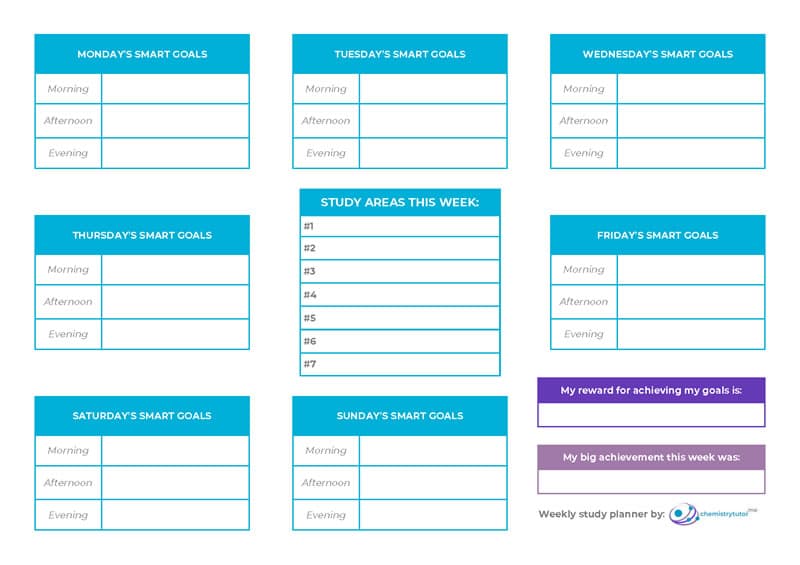
Subscribe to get your FREE study planner!
Revise more effectively and be better organised
Achieving top grades takes hard work and good preparation. A study planner (or revision timetable) is an essential part of that preparation. If you don’t plan your studying carefully, you cannot hope to be rewarded with a top grade.
My study planner is simple to use. You just identify the topics you need to study, then set SMART goals for each.
Which topics should I revise?
- Use your exam board syllabus to identify the topics you need to cover.
- Use a simple red, amber, green highlighting system to assess your confidence in each topic.
- Give priority to difficult topics and weaknesses (you should know what these are, but if you’re unsure, think about tests or homework that you did badly in)
What are SMART goals?
SMART goals are smaller steps towards your overall objective (e.g. “be completely prepared for my GCSE chemistry exams”).
SMART goals are:
- Specific: your goal should target a specific topic.
- Measurable: you should have a way to measure progress.
- Achievable: your goal should be realistically achievable in the time you have allocated.
- Relevant: your goal should be linked to your long-term objective.
- Timed: you should set a time limit on achieving your goal.
An example of a SMART goal is “this evening, I will write up my notes on acids and bases and do 5 past paper questions, aiming for an average of 90%”.
Record this on the planner as “acids/bases notes, 5 exam questions, 90%”.
How long should I study?
If you want to do really well in your exams? A sensible guide is 1 hour study per taught hour, which typically means 15 – 20 hours study per week. If you want to fail? Then study for 0 hours per week. Seriously, this is one of the only times in your life when effort in is directly related to rewards out and it’s entirely down to you.
Also, bear in mind the following:
- Studying in shorter periods, spaced out over the week, is far more effective than long cramming sessions.
- Revisiting topics after a few days is the best way to make ideas stick.
Remember, work smarter, not harder!
What is the best way to study?
Keep it active is the golden rule.
Just reading over notes is passive and mostly ineffective.
Work through questions, create revision aids (mindmaps, flash cards etc.), write up notes in your own words instead (and ditch the highlighter!)
Learn from any mistakes you make when doing past paper questions so you don’t make them again!
Why is this study planner better?
Too often, students spend ages drawing up a revision timetable that really says “this week I’ll revise all my subjects a lot“. There are no goals, no methods to track progress. It’s vague and aimless.
The advantage of using a goal-based approach is it chunks your studying into manageable pieces, each with a definite target that you can work towards. No more aimlessly writing ‘chemistry,’ ‘biology’ and ‘physics’ into 1-hour slots.
Why just Morning, Afternoon and Evening slots?
Because studying should be a relaxed process and allow for some flexibility, not feel like you’re in a boot camp where every hour of your time is micromanaged.
I want it! How do I get access?
Just enter your email and name in the form below!





Leave A Comment